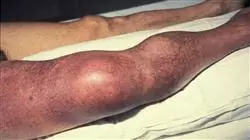University certificate
The world's largest faculty of medicine”
Introduction to the Program
This program is the best option you can find to specialize in Bioinformatics Applied to Venous Thromboembolism and to establish more accurate diagnoses”

Thrombosis is an often undiagnosed pathology that can affect anyone, regardless of age, and that can become a serious disease. Early detection of venous thrombosis is essential to treat the disease and reduce sequelae in patients. There are also preventive measures, such as physical or pharmacological ones.
Throughout this Postgraduate diploma, students will focus on Bioinformatics Applied to Venous Thromboembolism , with a program designed by specialists in the field, so students will receive a complete and specific training from area experts.
The training program aims to establish the basis of knowledge in the field, starting with studies of the pathophysiology and epidemiology of venous thromboembolic disease. Omics data will also be studied, which will enable specialists to learn the programming language R and predictive models.
Therefore, after completing and passing the Postgraduate diploma, students will have acquired the theoretical knowledge necessary to carry out effective treatment of venous thrombosis in the main areas of professional practice.
Don't miss the opportunity to study this Postgraduate diploma in Bioinformatics Applied to Venous Thromboembolism with us. It's the perfect opportunity to advance your career”
This Postgraduate diploma in Bioinformatics Applied to Venous Thromboembolism contains the most complete and up-to-date scientific program on the market. Its most notable features are:
- Case studies presented by experts in Bioinformatics Applied to Venous Thromboembolism
- The graphic, schematic, and practical contents with which they are created, provide scientific and practical information on the disciplines that are essential for professional development
- The latest developments in Bioinformatics Applied to Venous Thromboembolism
- Practical exercises where self-assessment can be used to improve learning
- Special emphasis is placed on innovative methodologies in Bioinformatics Applied to Venous Thromboembolism
- Theoretical lessons, questions to the expert, debate forums on controversial topics, and individual reflection assignments
- Content that is accessible from any fixed or portable device with an Internet connection
This Postgraduate diploma is the best investment you can make when selecting a refresher program, for two reasons: in addition to updating your knowledge of Bioinformatics Applied to Venous Thromboembolism , you will obtain a qualification endorsed by TECH Global University”
The teaching staff includes professionals in the field of Bioinformatics Applied to Venous Thromboembolism , who bring their experience to this specialization program, as well as renowned specialists from leading societies and prestigious universities.
The multimedia content, developed with the latest educational technology, will provide the professional with situated and contextual learning, i.e., a simulated environment that will provide immersive specialization programmed to learn in real situations.
This program is designed around Problem-Based Learning, whereby the specialist must try to solve the different professional practice situations that arise throughout the program. To that end, the professional will have the help of an innovative, interactive video system made by recognized and extensively experienced experts in Bioinformatics Applied to Venous Thromboembolism .
This training program comes with the best didactic material, providing you with a contextual approach that will facilitate your learning"

This 100% online Postgraduate diploma will allow you to combine your studies with your professional work while expanding your knowledge in this field"
Why study at TECH?
TECH is the world’s largest online university. With an impressive catalog of more than 14,000 university programs available in 11 languages, it is positioned as a leader in employability, with a 99% job placement rate. In addition, it relies on an enormous faculty of more than 6,000 professors of the highest international renown.

Study at the world's largest online university and guarantee your professional success. The future starts at TECH”
The world’s best online university according to FORBES
The prestigious Forbes magazine, specialized in business and finance, has highlighted TECH as “the world's best online university” This is what they have recently stated in an article in their digital edition in which they echo the success story of this institution, “thanks to the academic offer it provides, the selection of its teaching staff, and an innovative learning method aimed at educating the professionals of the future”
A revolutionary study method, a cutting-edge faculty and a practical focus: the key to TECH's success.
The most complete study plans on the university scene
TECH offers the most complete study plans on the university scene, with syllabuses that cover fundamental concepts and, at the same time, the main scientific advances in their specific scientific areas. In addition, these programs are continuously being updated to guarantee students the academic vanguard and the most in-demand professional skills. In this way, the university's qualifications provide its graduates with a significant advantage to propel their careers to success.
TECH offers the most comprehensive and intensive study plans on the current university scene.
A world-class teaching staff
TECH's teaching staff is made up of more than 6,000 professors with the highest international recognition. Professors, researchers and top executives of multinational companies, including Isaiah Covington, performance coach of the Boston Celtics; Magda Romanska, principal investigator at Harvard MetaLAB; Ignacio Wistumba, chairman of the department of translational molecular pathology at MD Anderson Cancer Center; and D.W. Pine, creative director of TIME magazine, among others.
Internationally renowned experts, specialized in different branches of Health, Technology, Communication and Business, form part of the TECH faculty.
A unique learning method
TECH is the first university to use Relearning in all its programs. It is the best online learning methodology, accredited with international teaching quality certifications, provided by prestigious educational agencies. In addition, this disruptive educational model is complemented with the “Case Method”, thereby setting up a unique online teaching strategy. Innovative teaching resources are also implemented, including detailed videos, infographics and interactive summaries.
TECH combines Relearning and the Case Method in all its university programs to guarantee excellent theoretical and practical learning, studying whenever and wherever you want.
The world's largest online university
TECH is the world’s largest online university. We are the largest educational institution, with the best and widest online educational catalog, one hundred percent online and covering the vast majority of areas of knowledge. We offer a large selection of our own degrees and accredited online undergraduate and postgraduate degrees. In total, more than 14,000 university degrees, in eleven different languages, make us the largest educational largest in the world.
TECH has the world's most extensive catalog of academic and official programs, available in more than 11 languages.
Google Premier Partner
The American technology giant has awarded TECH the Google Google Premier Partner badge. This award, which is only available to 3% of the world's companies, highlights the efficient, flexible and tailored experience that this university provides to students. The recognition as a Google Premier Partner not only accredits the maximum rigor, performance and investment in TECH's digital infrastructures, but also places this university as one of the world's leading technology companies.
Google has positioned TECH in the top 3% of the world's most important technology companies by awarding it its Google Premier Partner badge.
The official online university of the NBA
TECH is the official online university of the NBA. Thanks to our agreement with the biggest league in basketball, we offer our students exclusive university programs, as well as a wide variety of educational resources focused on the business of the league and other areas of the sports industry. Each program is made up of a uniquely designed syllabus and features exceptional guest hosts: professionals with a distinguished sports background who will offer their expertise on the most relevant topics.
TECH has been selected by the NBA, the world's top basketball league, as its official online university.
The top-rated university by its students
Students have positioned TECH as the world's top-rated university on the main review websites, with a highest rating of 4.9 out of 5, obtained from more than 1,000 reviews. These results consolidate TECH as the benchmark university institution at an international level, reflecting the excellence and positive impact of its educational model.” reflecting the excellence and positive impact of its educational model.”
TECH is the world’s top-rated university by its students.
Leaders in employability
TECH has managed to become the leading university in employability. 99% of its students obtain jobs in the academic field they have studied, within one year of completing any of the university's programs. A similar number achieve immediate career enhancement. All this thanks to a study methodology that bases its effectiveness on the acquisition of practical skills, which are absolutely necessary for professional development.
99% of TECH graduates find a job within a year of completing their studies.
Postgraduate Diploma in Bioinformatics Applied to Venous Thromboembolism
Bioinformatics is a key tool in the study of Venous Thromboembolic Disease, a pathology that causes a large number of deaths worldwide annually. The complexity of this disease requires an interdisciplinary approach involving Genetics, Molecular Biology, Physiology and Informatics to optimize its diagnosis and treatment. Therefore, it is essential for specialists to keep themselves updated in this field on a continuous basis, in order to be at the forefront of Medicine. Because of this, TECH has developed the Postgraduate Diploma in Bioinformatics Applied to Venous Thromboembolism, focused entirely on the update in this field. Likewise, the knowledge acquired through this program will be fully applicable in your daily clinical practice, enriching your professional performance.
Get up to date in this medical area in only 6 months of learning.
Throughout the Postgraduate Diploma you will focus on Bioinformatics applied to Venous Thromboembolism, identify recent advances in the pathophysiology and epidemiology of Venous Thromboembolic Disease, delve into the study of omics data or delve into the cutting-edge R programming language and predictive models. All this, enjoying a curriculum designed by leading experts in this field, who have extensive medical experience behind them in prestigious hospitals. In addition. You will enjoy a 100% online mode that will enable you to study without the need to move from your own home. Getting an excellent health update has never been as easy as it is with TECH, enroll!







